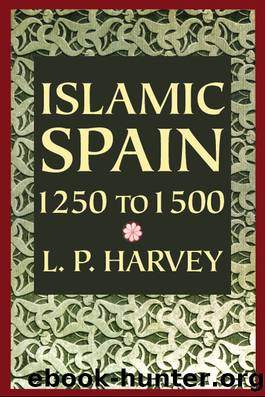Islamic Spain, 1250 to 1500 by L. P. Harvey

Author:L. P. Harvey [Harvey, L. P.]
Language: eng
Format: epub
Tags: Nonfiction, History, Spain & Portugal, Medieval
ISBN: 9780226227740
Publisher: University of Chicago Press
Published: 2014-05-19T04:00:00+00:00
_____________
1 BAE:LXVI, 163. For his treatises on chivalry, see Juan Manuel 1982 and B AE : LI (Libro del ccmallero et del escudero; Libro de las armas; Libro de los Estados).
2 Soldevila 1983: 888. âLa gran desconeixença que els castellans li havien feta.â
3 Tapia 1986: 225 (for the whole siege, 171â232).
THIRTEEN
YÅ«suf I (1333â1354)
The solidity of YÅ«suf Iâs contribution to Granadan life and culture is made apparent to any visitor to the Alhambra nowadays: an inscription records his construction of the Puerta de la Justicia, the massive gateway permitting access to the palace complex. No longer in existence is his major creation, the monumental madrasa or college for the city. YÅ«suf presided over the beginning of what was undoubtedly the Golden Age of Granadan cultural achievements, but he was also ruler at the time of the greatest single reverse suffered by the Muslim cause in Spain until the final loss of Granada in 1492: the Christian victory of Salado in 1340. YÅ«suf does not appear to have had blame imputed to him for Salado. As a leader he appears to have enjoyed the trust of his subjects.
We are told by Ibn KhaldÅ«n that âas soon as AbÅ« ḤajjÄj YÅ«suf [YÅ«suf I] came to power, he hastened to take revenge for his brother [Muḥammad IV], drove out the BanÅ« Abiʾl-Ê¿UlÄ into exile in Tunisia, and appointed YaḥyÄ b.Ê¿Umar b. Raḥḥū, one of the BanÅ« Raḥḥū b.Ê¿Abd al-Ḥaqq, as commander of those fighting on the frontier in the holy war, in die place of AbÅ« ThÄbitâ (1898:414). By the standard of acts of revenge in those days, it must be said that this was quite restrained, but it will be recalled that in the version recorded by Ibn KhaldÅ«n,Ê¿UthmÄn was claiming that far from being the assassin, he was the assassinâs executioner.
YÅ«suf could not risk alienating North African sympathies: he needed an inflow of Volunteers, and in fact his next action was to cross the straits and seek from AbÅ«âl-Ḥasan further military assistance (Ibn KhaldÅ«n 1898: 414). Abūʾl-Ḥasan sent his son AbÅ« MÄlik, who in 1339 would meet his death at the hands of a Castilian raiding party.
The Muslim states of the west and the Christian kingdoms of the peninsula, above all Castile, had all been locked in a succession of combats for more than half a century, disputing the mastery of the Straits of Gibraltar. Associated with this conflict was the question of the extent to which the Marīnids (or other North African powers) might establish control in the peninsula similar to that enjoyed in earlier ages by Almoravids or Almohads. That conflict over the straits was about to be resolved in favor of the Castilians, and as for the Marīnids, they were to become less and less interested in peninsular affairs. It might seem likely that the new situation would create insuperable problems for the Naṣrids, but Yūsuf and his successors proved able to accommodate themselves to the new power balance.
Yūsuf had made truces with Castile after his accession, and then entered into a formal tripartite peace with Castile and with the Marīnids.
Download
This site does not store any files on its server. We only index and link to content provided by other sites. Please contact the content providers to delete copyright contents if any and email us, we'll remove relevant links or contents immediately.
| Hadith | History |
| Law | Mecca |
| Muhammed | Quran |
| Rituals & Practice | Shi'ism |
| Sufism | Sunnism |
| Theology | Women in Islam |
The History of Jihad: From Muhammad to ISIS by Spencer Robert(2618)
Nine Parts of Desire by Geraldine Brooks(2356)
The Turkish Psychedelic Explosion by Daniel Spicer(2352)
The First Muslim The Story of Muhammad by Lesley Hazleton(2263)
The Essential Rumi by Coleman Barks(2042)
1453 by Roger Crowley(2022)
The Last Mughal by William Dalrymple(1854)
Trickster Travels: A Sixteenth-Century Muslim Between Worlds by Davis Natalie Zemon(1839)
Muhammad: His Life Based on the Earliest Sources by Martin Lings(1644)
God by Aslan Reza(1639)
by Christianity & Islam(1627)
A Concise History of Sunnis and Shi'is by John McHugo(1563)
No God But God by Reza Aslan(1538)
Magic and Divination in Early Islam by Emilie Savage-Smith;(1533)
The Flight of the Intellectuals by Berman Paul(1501)
Nothing to Envy by Barbara Demick(1445)
Art of Betrayal by Gordon Corera(1429)
What the Qur'an Meant by Garry Wills(1390)
Getting Jesus Right: How Muslims Get Jesus and Islam Wrong by James A Beverley & Craig A Evans(1338)
